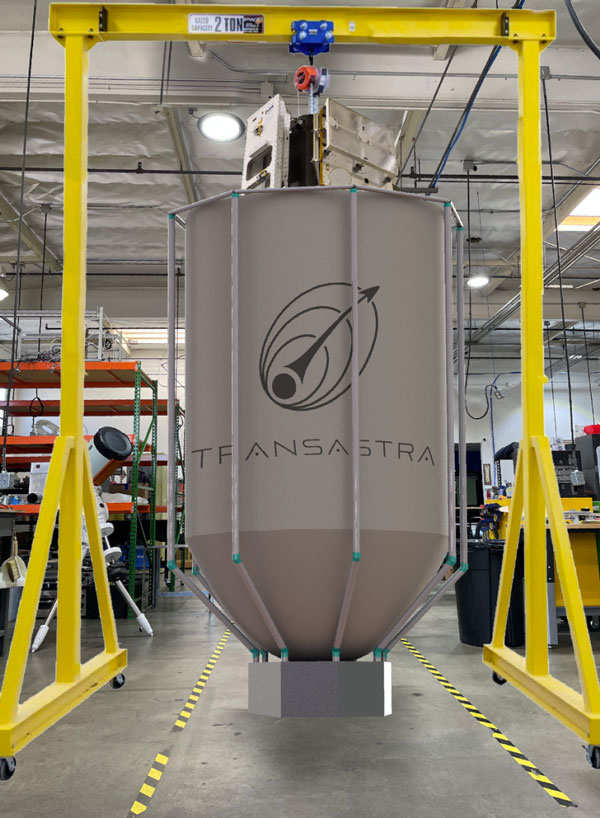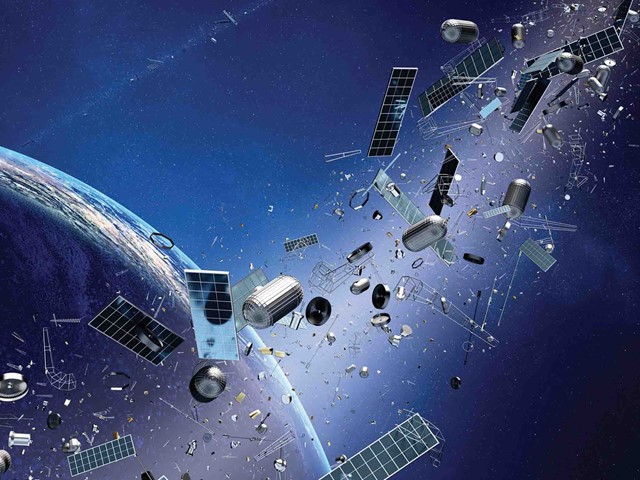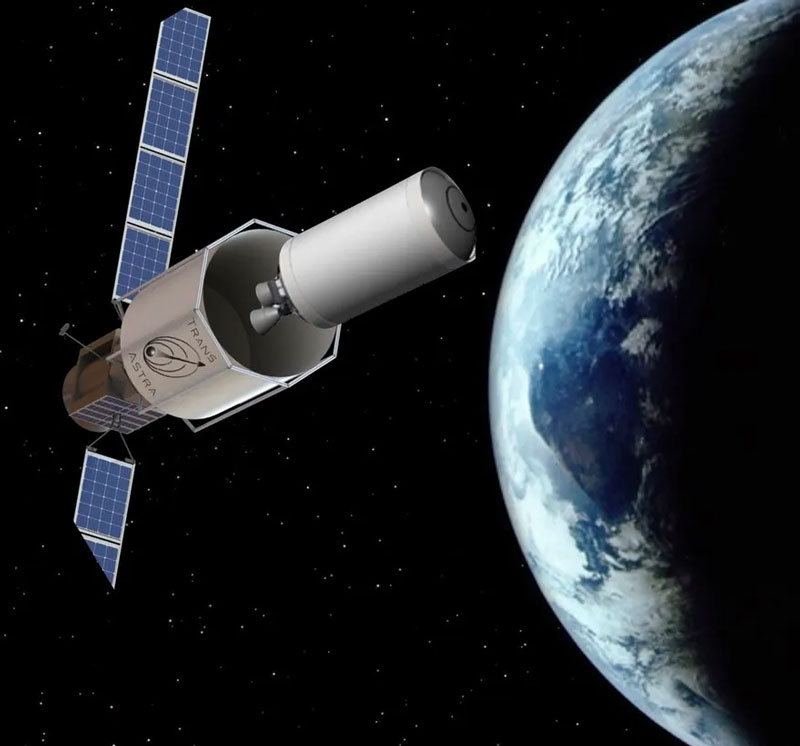
Space debris will be collected with a huge inflatable bag: The project will be funded by NASA
TransAstra, a pioneering space startup, has clinched a prestigious contract from NASA to design and manufacture an innovative capture bag aimed at addressing the pressing issue of orbital debris. Under the newly awarded Phase 2 Small Business Innovation Research contract, valued at $850,000, TransAstra will embark on the creation of an inflatable capture bag and conduct rigorous ground demonstrations of its capabilities. The technology utilizes inflatable struts to facilitate the bag's opening and closure, enabling it to envelop noncooperative objects in space, Spacenews reports.
The concept of capture bag technology traces its origins to the NASA Jet Propulsion Laboratory, where it was initially devised for the ambitious Asteroid Redirect Mission, which seeks to rendezvous with a near-Earth asteroid and transport it to cislunar orbit. Building upon this foundation, TransAstra had previously constructed a small-scale capture bag in 2021, thanks to funding from NASA's Innovative Advanced Concepts program.

This latest contract was awarded through NASA's SBIR Ignite program, which is dedicated to supporting early-stage technological innovation with the potential for commercial applications. Joel Sercel, the visionary founder and CEO of TransAstra, shared the company's evolution of thought: "We originally developed this small capture bag prototype to demonstrate asteroid mining in low-Earth orbit with a synthetic asteroid, but we subsequently realized this is the greatest thing ever for orbital debris cleanup."
The versatile applications of the capture bag technology are vast. While smaller bags could potentially retrieve cubesats, larger versions hold the promise of enveloping spent rocket bodies, defunct geostationary communications satellites, and even massive 50,000-ton asteroids, according to Sercel.
One notable advantage of capture bags over alternative orbital debris cleanup techniques is their independence from specific fixtures on the target objects. Unlike methods requiring precise docking maneuvers, the capture bag can be skillfully maneuvered around a target without the need for direct physical contact. Sercel noted, "It doesn't require the target to have any fixture that you can grab onto... You have to be precise enough to open the bag, get the bag around this thing and close the bag."

Even in challenging scenarios such as dealing with rapidly spinning debris, the capture bag's adaptable design would allow it to synchronize its spin with the target to a certain extent. Additionally, TransAstra proposes a revolutionary approach to debris cleanup - capturing multiple objects with a single capture bag on a single mission. This strategy would significantly reduce the consumption of propellant and streamline the cleanup process.
A collaborative study conducted by TransAstra and ThinkOrbital, a prominent space infrastructure startup, advocates for transporting collected debris or defunct satellites to an on-orbit processing plant. This approach presents a remarkable six-fold reduction in costs compared to individually transporting objects to a lower altitude for reentry into Earth's atmosphere. Moreover, the reuse strategy substantially lowers propellant expenses by 82% and trims debris clearance time by 40%.
Sebastian Asprella, ThinkOrbital's Co-founder and CEO, hailed these findings, emphasizing their potential to revolutionize space industrialization. He stated, "These results validate and underscore the potential of this approach to resolve one of space's greatest and most urgent existential threats in a faster, easier and more economical and sustainable way."

TransAstra and ThinkOrbital intend to employ their capture bags in TransAstra Worker Bee spacecraft. This involves the Worker Bee moving into the targeted debris orbit, capturing the debris, and transporting it to ThinkOrbital's ThinkPlatform. This proposed platform, boasting a diameter of around 37 meters and a volume of 4,000 cubic meters, is envisioned to serve as an innovative hub for inspecting, repairing, and recycling space objects.
The combined efforts of TransAstra and ThinkOrbital herald the advent of an efficient ecosystem to tackle the burgeoning issue of space debris. Nicole Shumaker, TransAstra's Vice President of Strategic Partnerships, highlighted the transformational potential: "Recycling stations in space resolve this problem and transform what was previously a liability into an asset that not only mitigates orbital debris but opens up new possibilities for in-space manufacturing and construction."
The study conducted by the two companies employed extensive computer simulations, comparing costs and propellant requirements for different approaches to debris disposal. Remarkably, the benefits of reusing debris remained consistent across varying debris masses and orbital altitudes, showcasing the robustness of the proposed solution.
Lee Rosen, ThinkOrbital's Co-founder and retired U.S. Air Force Colonel, emphasized the significance of this research in reshaping debris mitigation strategies: "This study demonstrates that we can and should be creatively rethinking the way we approach debris remediation. This is critical not only to the advancement of space exploration and industrialization but to our national defense." With TransAstra's pioneering technology and the visionary collaboration with ThinkOrbital, the future of orbital debris cleanup looks promising and sustainable.
- Related News
- Perseverance finds rock on Mars with signs of life on Earth (photo)
- On 25th anniversary of Chandra telescope, NASA released 25 photos previously unseen by the public
- Rare intermediate-mass black hole has been discovered at the center of our galaxy
- Stone "snowman" and pure sulfur crystals on Mars։ Remarkable discoveries by Perseverance and Curiosity
- When will humanity settle on Mars? Interview with Gernot Grömer
- TESS telescope discovers super-hot exoplanet the size of Neptune
- Most read
month
week
day
- Buyers massively complain about Samsung's Galaxy Buds 3 and Buds 3 Pro headphone, even finding hair in the box 824
- With today's mortgage interest rates, banks simply cannot sell products in 2025: Interview with Vardan Marutyan 816
- Ants and bees 'taught' tiny drones to navigate without GPS, beacons or lidars 677
- Samsung will release Galaxy Tab S10+ and Ultra tablets and Galaxy Z Fold 6 Slim and Galaxy w25 smartphones in October 645
- Mass production of iPhone SE 4 will begin this October, with sales starting in 2025 608
- Insider unveils specs of all smartphones of iPhone 17 series, including the 17 Slim 606
- Telegram's monthly active audience reaches 950 million 587
- What are the problems in the construction industry? Interview with Vardan Marutyan 569
- For the first time in history, iPhone will get a Samsung camera 564
- What dangers can feature phones from unknown manufacturers conceal? 560
- Archive
